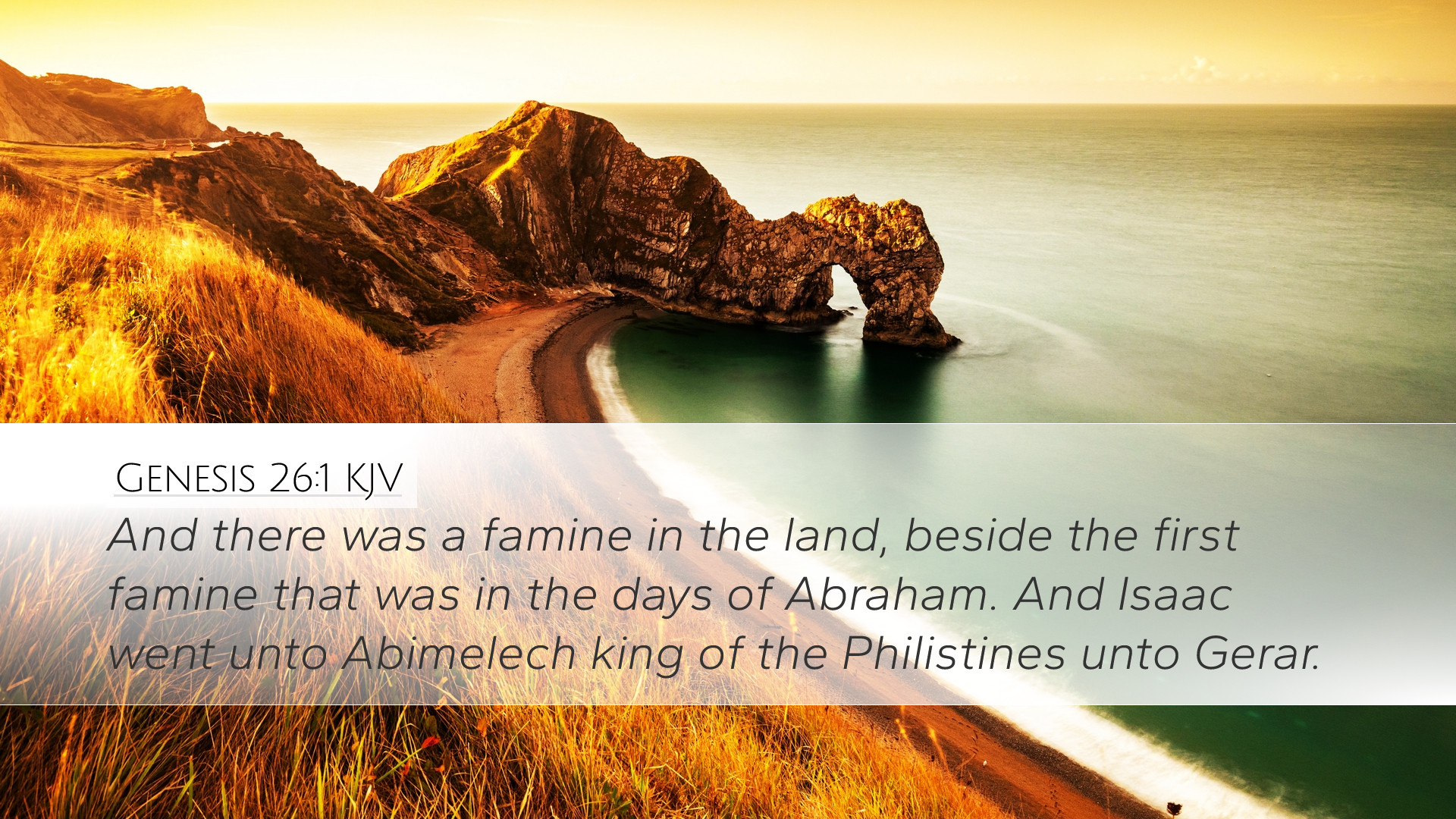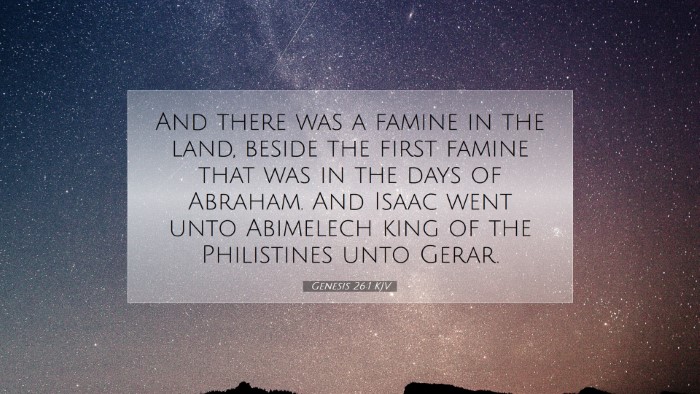Commentary on Genesis 26:1
Verse Text: "And there was a famine in the land, beside the first famine that was in the days of Abraham. And Isaac went unto Abimelech king of the Philistines unto Gerar."
Introduction
Genesis 26:1 introduces a significant event in the life of Isaac, portraying the trials and providence that accompany the patriarchal lineage. This commentary seeks to explore the implications of famine, the faith of Isaac, and the broader theological themes present in this verse, drawing on insights from esteemed public domain commentaries.
Contextual Background
Understanding the context of this verse is essential. The narrative unfolds after the life of Abraham, Isaac's father, during a time of hardship due to famine. This scenario mirrors a similar famine that occurred in Abraham's time, highlighting recurring struggles in the ancestral narratives of the Israelite people.
Historical and Cultural Context
- Famine in Ancient Times: Famine was a significant concern in the ancient Near East, affecting entire regions. As Matthew Henry notes, famines often prompted migration, a theme that recurs throughout scriptural history.
- Philistine Relations: The mention of King Abimelech indicates Isaac's interaction with non-Israelite nations. This relationship reflects broader themes of God’s covenantal promise amidst prevailing cultural tensions.
Theological Insights
This verse illustrates several key theological themes that resonate through Scripture:
Divine Providence
Isaac's journey into Gerar during a famine signifies the assertion of God's providence. Albert Barnes remarks on how such adverse conditions serve as means by which God tests faith. Rather than viewing famine purely as a disaster, it can be perceived as an opportunity for God to reveal His faithfulness and provision. This challenges both Isaac and believers today to trust in God's sustenance despite external circumstances.
Lessons from Isaac's Actions
Isaac's decision to seek refuge with Abimelech prompts important considerations about faith in action. While some may view his actions as a sign of doubt, Adam Clarke emphasizes the necessity of wisdom in adversity, suggesting that seeking assistance is not inherently a lack of faith, but rather a responsible approach in difficult times.
Covenantal Legacy
The mention of the famine being “beside the first famine” connects Isaac’s narrative to that of Abraham, reinforcing the themes of covenantal continuity. This continuity stresses that while individual challenges may arise, God’s promises remain steadfast throughout generations. Matthew Henry beautifully expresses that God’s covenant is as relevant in times of hardship as in times of abundance.
Examination of Key Phrases
"Famine in the Land"
This phrase signals not only a physical scarcity but also symbolizes spiritual deprivation. In a time where sustenance is lacking, the people may turn to God, igniting a deeper spiritual quest. Cross-references can be found throughout Scripture indicating that such times lead to greater reliance on God’s word (Deuteronomy 8:3).
"Isaac Went unto Abimelech"
The proactive step taken by Isaac symbolizes a mix of dependency and initiative. As highlighted by Clarke, Isaac's visit is indicative of both cultural diplomacy and the larger theme of God’s people interacting with neighboring nations. The social dynamics at play raise questions about identity and faithfulness amid surrounding cultures.
Practical Applications
For pastors, students, theologians, and scholars, this verse provides a wealth of insight into navigating crises in life and ministry:
- Trust in God's Provision: Like Isaac, believers are reminded to seek God earnestly, especially in difficult seasons. Understanding one’s reliance on God’s sovereignty becomes crucial.
- Engagement with Culture: The narrative propels discussion about how Christians interact with secular authorities. Navigating cultural waters requires both wisdom and integrity.
- Reflect on God's Covenantal Nature: Consider how personal and corporate identities are shaped by the covenant God makes with His people. Address contexts in which God’s steadfast love is revealed amidst trials.
Conclusion
Genesis 26:1 serves as a profound reminder of God's continual presence and faithfulness in the lives of His people, especially during times of struggle. By incorporating insights from public domain commentaries, we grasp the theological significance of this passage and its applicability to the contemporary believer. With themes of divine providence, covenant continuity, and active faith, this verse encourages a deeper exploration of one's relationship with God amid life's challenges.


